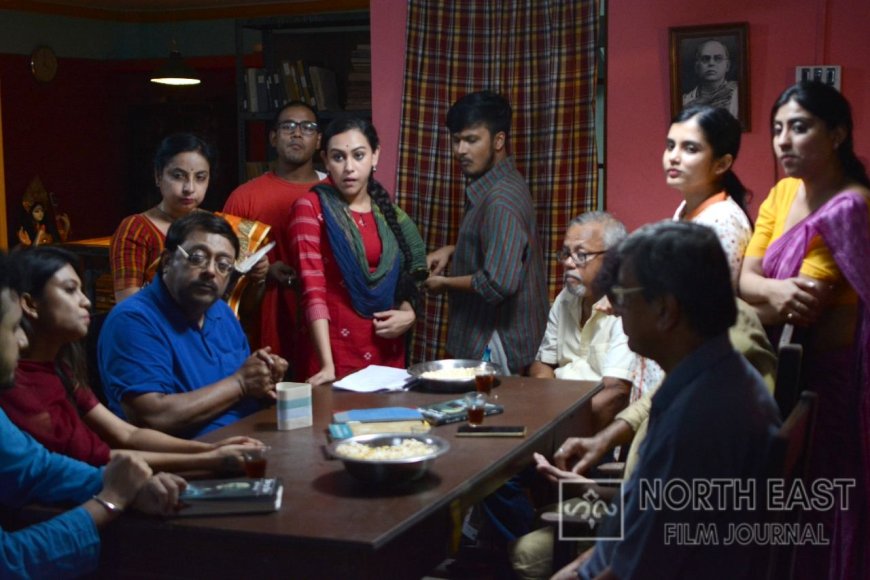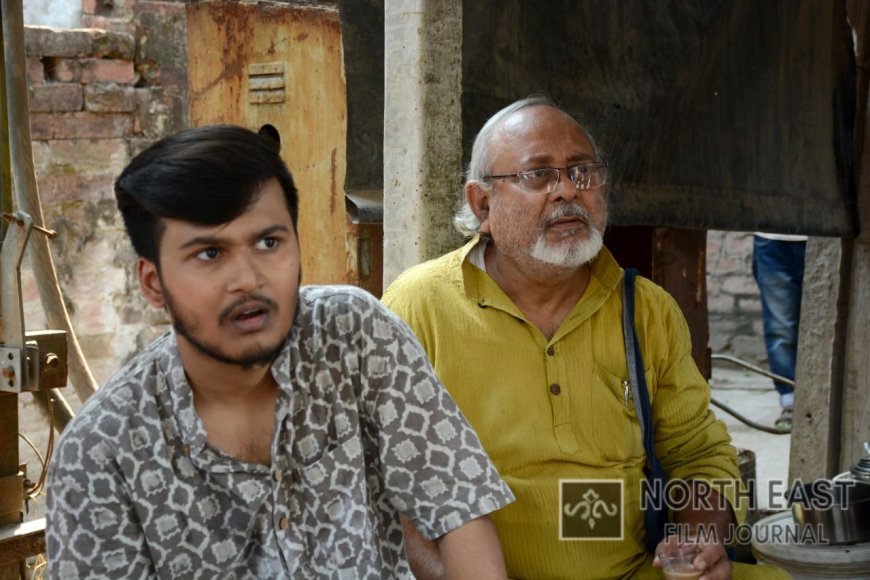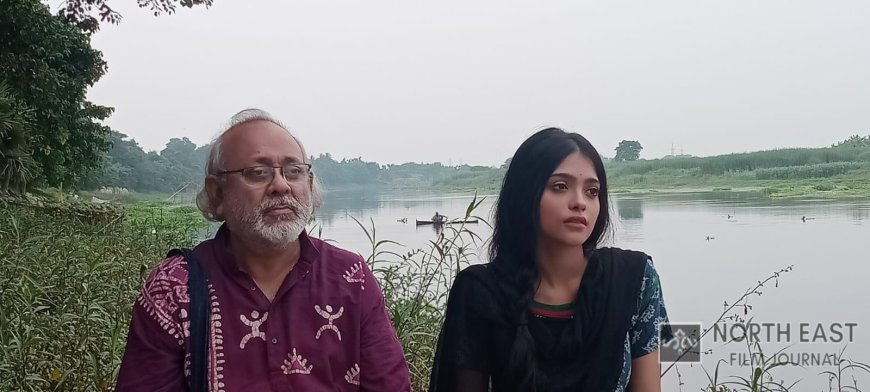"Hemanter Aparanha": An Unusual Film by Ashoke Viswanathan
Dr. Shoma A. Chatterji provides an interview-based review of the Bengali film HEMANTER APARANHA directed by Ashok Viswanathan.
Ashoke Viswanathan, son of eminent actor and Professor, N.Viswanathan and grandson of the renowned historian, Dr. Kalidas Nag, is a multiple national and international award-winning filmmaker and writer who is currently Professor at Satyajit Ray Film & Television Institute, Kolkata.
He has directed more than 150 film projects including feature films (Sunya Theke Suru, Kichu Sanglap Kichu Pralap, etc), documentaries, shorts and television shows. He also made a feature film Andhakare Alo on a very socially relevant subject a couple of years ago.
Viswanathan is a Charles Wallace scholar at Downing College, Cambridge(1997), and has won the Dishari, BFJA, Kalakar and Jaycees awards besides the Silver Torchlight award at Pyongyang (1994) as well as the Certificate of Merit for being the best resource person & presenter at the UGC-CEC Awards, 2006, for the 30 part series on Film Editing produced by EMRC, St.Xavier’s College, Kolkata. He has the distinction of having four of the fiction films, directed by him, included in the Indian Panorama sections of the International Film Festival of India in 1994, 1999, 2001, and 2002.
Viswanathan’s newest film Hemanter Aparanha based on his own story and in which he plays a major role, was screened in a packed auditorium at Nandan 2 recently. The film is aptly named Hemanter Aparanha (Autumn Afternoon) and was chosen for screening at the Kolkata International Film Festival last year.
The title is elaborated with aesthetically constructed visual and audio support as the narrative is centered on an old man who has retired and lives all alone in an old house in a suburb of Kolkata. This is a departure from both mainstream and off-mainstream cinema because the protagonist is an old man. Some youngsters appeal to him to take part in a play to be produced by the neighbouhood club authored by Pirandello but to be presented in Bengali. Sudhin Babu keeps on insisting that he has never ever acted in his life but the youngsters and elderly continue to insist and he gives in. And he is introduced to a completely new world he knew nothing about, begins to socialize with the theatre group with youngsters and old people and the director of the play (Ashoke Viswanathan) coming back to his humdrum, lonely life back home alone, often disturbed by the surreal imaginations of his dead wife (Bidipta Chakraborty) and an alternative surreal woman (Sohini Dasgupta). He also gets close to a young actress in the group named Papiya (Anusha Viswanathan) who tries to understand his psyche, his loneliness and his desire to belong.
So, superficially, we find Sudhin Babu actually living in two different worlds, one in the club room where he is trying his best to fit into his difficult role in the Pirandello play and the other back home where he has created his own alternative to loneliness through interactions with his dead wife and another imaginary dancer.
According to the director himself, “the film is about a superannuated gentleman, a widower, residing in the countryside is suddenly drawn into the world of theatre. The local group wants him in a Pirandello play and he becomes involved with one of the players, a young girl in her twenties. Against the backdrop of the pandemic and the imminent war in Ukraine, this story of a highly unlikely relationship unfolds even as a society looks on with baited breath. What complicates the narrative further is the near absurd presence of the protagonist's wife who may be one of two persons.”
As the rehearsals unfold, the director who is also the writer of the story of this film, takes slant potshots between cinema and theatre subtly pointing out that theatre is more organic, spontaneous and natural than cinema which, like the world it creates artificially, has become artificial itself with the men and women who work within are more in it for the money and the fame and less for real, creative satisfaction. So, there is a dichotomy here too, between the natural world of the committed stage and the synthetic world of commercial cinema of which Sudhin Babu can never be a part. Both Papiya and Rajesh (Rwitobroto Mukherjee) use theatre as a stepping stone to get into films and this becomes clear to Sudhin Babu who, hurt and disillusioned by the world around him, refuses to act in the Club’s next play and gets back to his lonely shell of surrealistic daydreams.
According to the director himself, “I begin by providing the director's perspective and then start identifying with the protagonist's travails and joys as he battles his own demons and savours his relationships with Papiya and Rajesh.”
This writer, however, feels that using a Pirandello play (Right You Are, If You Think So, 1917) filled with symbolic characters drawn from a Western perspective is likely to distance a major slice of the audience who may find this ‘foreign’ to their very Indian and Oriental conditioning to Indian stories and cinema. The theme is conflicting versions of the truth told by the main characters, each of whom claims the other is insane. And even as we watch the film and the play within the film, it is difficult to understand the ideology and the philosophy of the play.
Viswanathan counters this argument as he says, “Pirandello's explorations of reality and illusion as also his playful ambiguity seemed like a mirror to the main plot which dealt with dream and reality. The fact that this playwright could be esoteric was debated in the film and I wanted to show that small towns and so called subaltern players could come up with challenging material.” This point however, remains completely vague and abstract to the common viewer including a critic like yours truly.
The film is subtle, low key and quite understated as it ought to have been considering the rather low-key protagonist it is dealing with. But it offers beautiful visuals not because of their picturesque beauty and aesthetics, but because of its touch with the grassroots Bengal or rather, how little of it remains alive to this day.
The film is shot almost completely on locations like Bogula in Nadia district, Churning River in Krishnanagar, Utpal Dutta Manch in Rajpur, portions of Rajpur, Sonarpur and Narendrapur in South 24 parganas, Kasba in Kolkata and a house near the bypass close to Santoshpur. The mood music is well positioned within the visuals and the drama and Viswanathan who has written the lyrics, says, “I told the music director to avoid mood music and instead devise a score that was sensitive, tinged with pathos and rooted in Indian folk traditions.”
The narrative of the film comes to a close a few years after the incident of the Pirandello play and we see a much older Sudhin-da dreaming of locking up his old house and trotting off on the back of a white horse. In reality however, he is surprised by some visitors from his theatre days come to see him. Among them is Papiya in a luxury car, now a famous film star and a mature and older Rajesh, now a noted director. Strangely however, he recognizes Rajesh but does not recognize Papiya at all. A shocked Papiya walks back to her limousine. Why? Probably because Sudhin-da finds Papiya turned into a synthetic member of a synthetic world while Rajesh, though successful, has sustained some of his boyish innocence. The film’s winning point is the very good performance of newcomer Satyapriya Mukhopadhyay in his maiden role as Sudhin-da.
Hemanter Aparanha leaves you with mixed feelings of confusion. The confusion when a person lives within two different worlds – his world of sudden action through theatre and his lonely world filled with surrealistic dreams. The confusion that arises when confronted with the lost ideology of Pirandello and the compromising world of artifice in cinema today. And last but never the least, the confusion that arises between deciding to permit a man to lead the life he is content in and to introduce him to a world that destroys that world he truly belonged to.
*****
What's Your Reaction?





































































